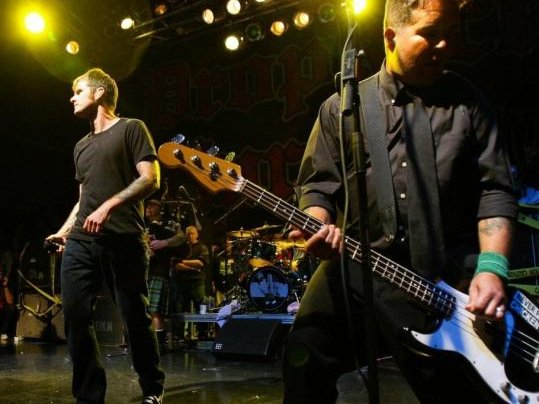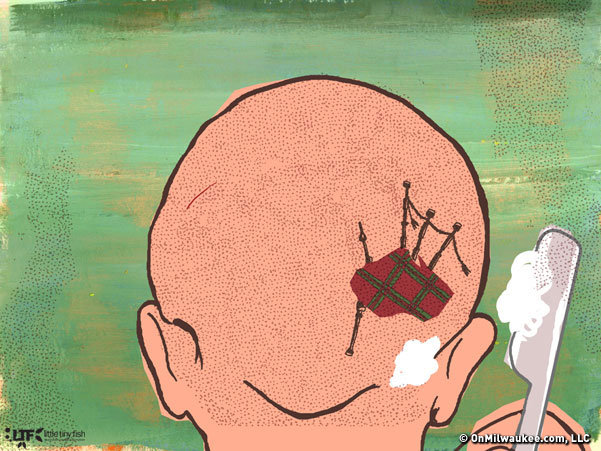"I think it's the upside of a band that is fortunate enough to have a loyal, die-hard fan base," founding member Ken Casey says. "Chances are, if people have to cut back to that one show a week or one show a month, because of their history with us.... we'd be the show they're going to."
OnMilwaukee.com spoke with Casey by phone Thursday morning as he prepared for a show in Fargo, N.D.
OnMilwaukee.com: The recession has impacted just about every aspect of American life. You tour so much that you're probably a good barometer. How is life on the road? Are you noticing the effects in terms of attendance or even the vibe at shows?
Ken Casey: We played Billings, Mont., last night. It was sold out. Everybody was there -- livestock included. I think they came down out of the mountains. If there is only one show coming that month, no one is going to miss it.
OMC: Is that a benefit of playing in smaller towns?
KC: If you're in some of these cities that have five, six, seven good shows a week, people can pick and choose. There is a gratitude factor and excitement factor in some of the smaller towns that you don't get in the jaded big cities.
OMC: The Dropkicks are so closely identified with the Red Sox and Bruins in Boston and now your music gets played a lot at stadiums all over the country. When you started the band in a basement 13 years ago, could you have envisioned crossing over into the sports world like you have?
KC: In a weird way, yes -- but only in the sense of in the beginning, we were writing songs about growing up being Boston sports fans and kind of the nature of where we were coming from. I'm not thinking I thought they'd be played, but we kind of wore our hearts on our sleeves right off the bat in terms of our love of Boston sports.
I certainly didn't think I'd hear it in other cities. You don't always hear it when you want.
The Bruins lost to the Panthers in Florida last week and to rub it in with 30 seconds left, they played "Shipping Up to Boston" there.
I guess it's become so associated with Boston sports that teams are playing it to rub it in when we're losing, which isn't very often this year when you're a Bruins fan. I guess we can hack it.
OMC: How would you describe the band to people who haven't heard you much or been to a show?
KC: It's kind of party music, good time music. That's what we kind of wanted to be. And I guess it lends itself to being played in stadiums. What makes us stand out from other bands is that it's a little more real; (it's) about real life things, whether its rooting for sports, or your family or just the struggles of life or the good times of life.
I think sometimes that's very contrary to the pop, stilted stuff you would hear in mainstream music. That's what attracts people to the music. It's that real urgency of it that kind of that lends itself to sports -- in a crucial moment of a game or something, it's music that gets people pumped up.
OMC: We hear you're doing your part to stimulate the economy by opening a pub in Boston, McGreevy's. How is that going?
KC: It's been a whole new set of headaches, but it's also a great, interesting thing that is completely opposite of the band. Basically, McGreevy's Third Base Saloon was the original Red Sox bar. It opened in 1894 and closed in prohibition. Once we did the song "Tessie," it kind of unearthed the history of that era. 'Nuff Said McGreevy is mentioned in the song "Tessie" many times.
We did the history on the bar. I got together with a friend of mine, Pete Nash, who is baseball historian. He built a replica of McGreevy's for an exhibit up in Cooperstown. Here was this awesome replica bar that doesn't serve alcohol sitting up in Cooperstown and we got the bright idea -- wouldn't it be better suited to be back in Boston and actually have the taps working? We opened it up in Boston. It's been a big hit. It's kind of given a home for the story of the song. It's given kind of a daily home for Dropkick fans and Red Sox fans. They like their history and they like their baseball. It's a good mix for the city. It's been a success so far, I'm happy to report.
Host of “The Drew Olson Show,” which airs 1-3 p.m. weekdays on The Big 902. Sidekick on “The Mike Heller Show,” airing weekdays on The Big 920 and a statewide network including stations in Madison, Appleton and Wausau. Co-author of Bill Schroeder’s “If These Walls Could Talk: Milwaukee Brewers” on Triumph Books. Co-host of “Big 12 Sports Saturday,” which airs Saturdays during football season on WISN-12. Former senior editor at OnMilwaukee.com. Former reporter at the Milwaukee Journal Sentinel.






